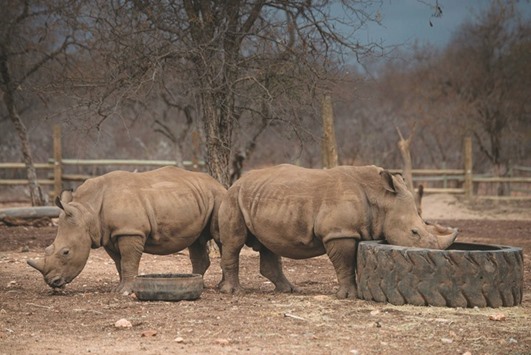The European Union yesterday sought seeking tighter international controls on hunting trophy imports amid a heated debate at a key wildlife conference, as animal rights activists called for the entire industry to be banned.
The proposal was tabled at the 17th meeting of the Convention on Illegal Trade in Endangered Species of Wild Flora and Fauna (CITES), which is bringing together about 2,500 delegates from more than 180 countries in Johannesburg.
The EU believes that trophy hunting “can help the conservation of species and local communities” when it is done legally and sustainably, said Gael de Rotalier, team leader for the EU at the conference.
But rules on the importation of hunting trophies vary in different countries, with many of them allowing hunters to import some trophies as personal goods without guarantees that they were obtained in legal and sustainable hunts, he explained.
The EU and South Africa are now proposing that CITES countries require sustainability certificates for all trophies.
EU sources said the proposal was likely to be adopted.
But the move was not expected to end the hunting debate.
The European Union imports tens of thousands of animal trophies annually.
Prices for trophy hunts in southern Africa range from hundreds of dollars for antelopes to tens of thousands of dollars for lions,
elephants or rhinoceroses.
International criticism of trophy hunting has increased massively since a US hunter killed a well-known, tracking-collared lion known as Cecil in Zimbabwe in July 2015, according to hunters and animal rights activists.
Opposition has also grown amid reports that Africa’s elephant population has dramatically declined.
It dropped by 111,000 to 415,000 individuals since poaching surged in 2006, according to the International Union for Conservation of Nature (IUCN).
“We don’t see why there is a need to hunt animals for sport,” said Jason Bell from the International Fund for Animal Welfare (IFAW).
“There are more sustainable forms of bringing (financial) benefits to local communities, such as eco-tourism,” he added.
Hunters’ representatives, however, argue that hunting helps to maintain animal populations at sustainable levels.
The global decline of elephant populations does not reflect the situation in many parts of southern Africa, which have so many elephants that they upset the ecosystem and deprive other species of food, said Ron Thomson from the pro-hunting association True Green Alliance.
If the EU proposal to tighten controls on trophy imports is adopted,
trophies obtained in “clearly unsustainable” hunts could no longer be imported, de Rotalier said.

Protected rhinos roam and feed in an enclosed precinct at the Kahya Ndlovu Lodge in Hoedspruit, Limpopo province, South Africa.
